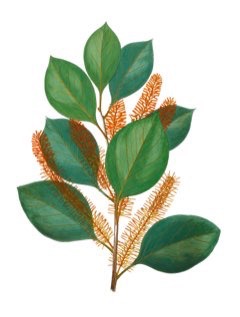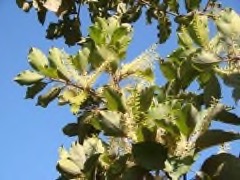 |
|
http://www.edibleplants.org |
 |
| João de Deus Medeiros flickr.com |
Translate this page:
Summary
Roupala montana can be a shrub or a tree growing about 1-8 m tall in South America. It is deciduous characterized by a dense and round crown, low branches, and cylindrical bole that is 40-70 cm in diameter. It has no edible use but valued medicinally and as aphrodisiac. It is also used for fuel wood, high quality charcoal, woodworking, and construction.
Physical Characteristics

 Roupala montana is a deciduous Tree growing to 15 m (49ft) by 15 m (49ft) at a medium rate.
Roupala montana is a deciduous Tree growing to 15 m (49ft) by 15 m (49ft) at a medium rate.
See above for USDA hardiness. It is hardy to UK zone 10.
Suitable for: light (sandy) and medium (loamy) soils and prefers well-drained soil. Suitable pH: mildly acid, neutral and basic (mildly alkaline) soils and can grow in very acid soils.
It cannot grow in the shade. It prefers moist or wet soil.
UK Hardiness Map
US Hardiness Map
Synonyms
Rhopala boissieriana Meisn. Rhopala complicata Kunth Rhopala dentata R.Br. Rhopala gardneri Meisn. R
Plant Habitats
Edible Uses
References More on Edible Uses
Medicinal Uses
Plants For A Future can not take any responsibility for any adverse effects from the use of plants. Always seek advice from a professional before using a plant medicinally.
An infusion of the bark is used as a nerve stimulant[46].
References More on Medicinal Uses
The Bookshop: Edible Plant Books
Our Latest books on Perennial Plants For Food Forests and Permaculture Gardens in paperback or digital formats.

Edible Tropical Plants
Food Forest Plants for Hotter Conditions: 250+ Plants For Tropical Food Forests & Permaculture Gardens.
More

Edible Temperate Plants
Plants for Your Food Forest: 500 Plants for Temperate Food Forests & Permaculture Gardens.
More

More Books
PFAF have eight books available in paperback and digital formats. Browse the shop for more information.
Shop Now
Other Uses
Wood
Other Uses The wood is rough-textured, cross-grained, heavy, hard, with moderate mechanical properties, very durable in dry sites or when immersed in salt water. The wood is quite ornamental, especially the radial section, and has been compared with the European oak. It is used particularly for making furniture, fine cases and ornamental objects; and can also be used in naval construction, for sculptures, linings, window and door frames etc[419 ]. (This report is for Roupala montana brasiliensis).
Special Uses
References More on Other Uses
Cultivation details
A plant of mainly lowland areas in the tropics. It grows best in areas where the mean annual temperature is 18 - 25°c and the mean annual rainfall is 1,500 - 3,000mm with a distinct dry season[337 ]. Grows best in a sunny position[419 ]. Succeeds in a wide range of soil types in the wild, though it grows best in soils with good drainage[337 ]. Young plants have a moderate rate of growth[419 ].
References Carbon Farming Information and Carbon Sequestration Information
Temperature Converter
Type a value in the Celsius field to convert the value to Fahrenheit:
Fahrenheit:
The PFAF Bookshop
Plants For A Future have a number of books available in paperback and digital form. Book titles include Edible Plants, Edible Perennials, Edible Trees,Edible Shrubs, Woodland Gardening, and Temperate Food Forest Plants. Our new book is Food Forest Plants For Hotter Conditions (Tropical and Sub-Tropical).
Shop Now
Plant Propagation
Seed - best sown as soon as it is ripe in a partially shaded position in a nursery seedbed or in individual containers. A germination rate in excess of 90% can be expected, with the seed sprouting within 10 - 15 days[419 ]. The seedlings develop quickly and they should be ready to plant out 5 - 7 months later[419 ].
Other Names
If available other names are mentioned here
Native Range
NORTHERN AMERICA: Mexico (San Luis Potosí, Chiapas, Guerrero, Hidalgo, Oaxaca, Querétaro, Tabasco, Veracruz de Ignacio de la Llave) SOUTHERN AMERICA: French Guiana, Guyana, Suriname, Venezuela, Brazil (Acre, Alagoas, Amapá, Amazonas, Bahia, Ceará, Distrito Federal, Espírito Santo, Goiás, Maranhão, Mato Grosso, Mato Grosso do Sul, Minas Gerais, Pará, Paraíba, Paraná, Pernambuco, Piauí, Rio de Janeiro, Rio Grande do Sul, Rondônia, Roraima, Santa Catarina, São Paulo, Sergipe, Tocantins), Bolivia (Chuquisaca, El Beni, La Paz, Pando, Santa Cruz), Ecuador (Napo)
Weed Potential
Right plant wrong place. We are currently updating this section.
Please note that a plant may be invasive in one area but may not in your area so it's worth checking.
Conservation Status
IUCN Red List of Threatened Plants Status : This taxon has not yet been assessed

Growth: S = slow M = medium F = fast. Soil: L = light (sandy) M = medium H = heavy (clay). pH: A = acid N = neutral B = basic (alkaline). Shade: F = full shade S = semi-shade N = no shade. Moisture: D = dry M = Moist We = wet Wa = water.
Now available:
Food Forest Plants for Mediterranean Conditions
350+ Perennial Plants For Mediterranean and Drier Food Forests and Permaculture Gardens.
[Paperback and eBook]
This is the third in Plants For A Future's series of plant guides for food forests tailored to
specific climate zones. Following volumes on temperate and tropical ecosystems, this book focuses
on species suited to Mediterranean conditions—regions with hot, dry summers and cool, wet winters,
often facing the added challenge of climate change.
Read More
Expert comment
Author
Aubl.
Botanical References
Links / References
For a list of references used on this page please go here
A special thanks to Ken Fern for some of the information used on this page.
Readers comment
| Add a comment |
|
If you have important information about this plant that may help other users please add a comment or link below. Only comments or links that are felt to be directly relevant to a plant will be included. If you think a comment/link or information contained on this page is inaccurate or misleading we would welcome your feedback at [email protected]. If you have questions about a plant please use the Forum on this website as we do not have the resources to answer questions ourselves.
* Please note: the comments by website users are not necessarily those held by PFAF and may give misleading or inaccurate information.
To leave a comment please Register or login here All comments need to be approved so will not appear immediately.
|
Subject : Roupala montana
|
|
|
|